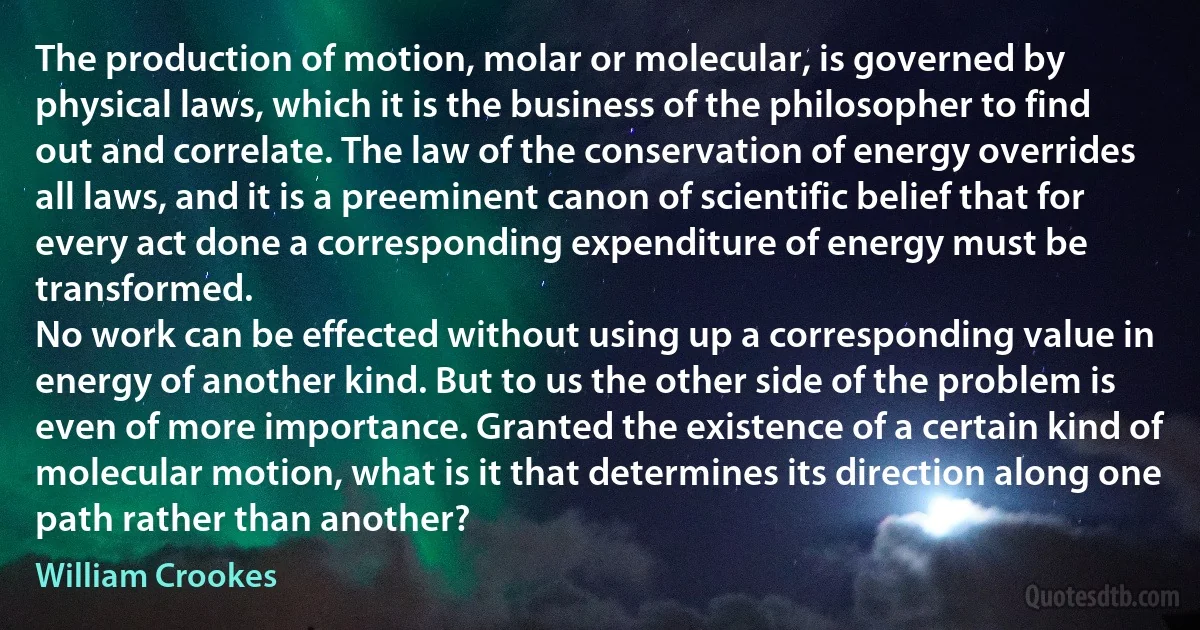
The production of motion, molar or molecular, is governed by physical laws, which it is the business of the philosopher to find out and correlate. The law of the conservation of energy overrides all laws, and it is a preeminent canon of scientific belief that for every act done a corresponding expenditure of energy must be transformed. No work can be effected without using up a corresponding value in energy of another kind. But to us the other side of the problem is even of more importance. Granted the existence of a certain kind of molecular motion, what is it that determines its direction along one path rather than another?
William CrookesRelated topics
act business certain conservation correlate direction done find kind law molecular path problem production side using value work lawsRelated quotes
I hold in fact
(1) That small portions of space are in fact of a nature analogous to little hills on a surface which is on the average flat; namely, that the ordinary laws of geometry are not valid in them.
(2) That this property of being curved or distorted is continually being passed on from one portion of space to another after the manner of a wave.
(3) That this variation of the curvature of space is what really happens in that phenomenon which we call the motion of matter, whether ponderable or etherial.
(4) That in the physical world nothing else takes place but this variation, subject possibly to the law of continuity.

William Kingdon Clifford
The End of History was never linked to a specifically American model of social or political organisation. Following Alexandre Kojève, the Russian-French philosopher who inspired my original argument, I believe that the European Union more accurately reflects what the world will look like at the end of history than the contemporary United States. The EU's attempt to transcend sovereignty and traditional power politics by establishing a transnational rule of law is much more in line with a "post-historical" world than the Americans' continuing belief in God, national sovereignty, and their military.

Francis Fukuyama
In [Aristotle's] formal logic, thought is organized in a manner very different from that of the Platonic dialogue. In this formal logic, thought is indifferent toward its objects. Whether they are mental or physical, whether they pertain to society or to nature, they become subject to the same general laws of organization, calculation, and conclusion - but they do so as fungible signs or symbols, in abstraction from their particular "substance." This general quality (quantitative quality) is the precondition of law and order - in logic as well as in society - the price of universal control.

Herbert Marcuse
Marcel Duchamp, one of this century's pioneers, moved his work through the retinal boundaries which had been established with Impressionism into a field where language, thought and vision act upon one another. There it changed form through a complex interplay of new mental and physical materials, heralding many of the technical, mental and visual details to be found in more recent art... He declared that he wanted to kill art ('for myself') but his persistent attempts to destroy frames of reference altered our thinking, established new units of thought, a "new thought for that object."

Jasper Johns
It is conceivable that animal life might have the attribute of using the heat of surrounding matter, at its natural temperature, as a source of energy for mechanical effect.... The influence of animal or vegetable life on matter is infinitely beyond the range of any scientific enquiry hitherto entered on. Its power of directing the motions of moving particles, in the demonstrated daily miracle of our human free-will, and in the growth of generation after generation of plants from a single seed, are infinitely different from any possible result of the fortuitous concurrence of atoms.

William Thomson
